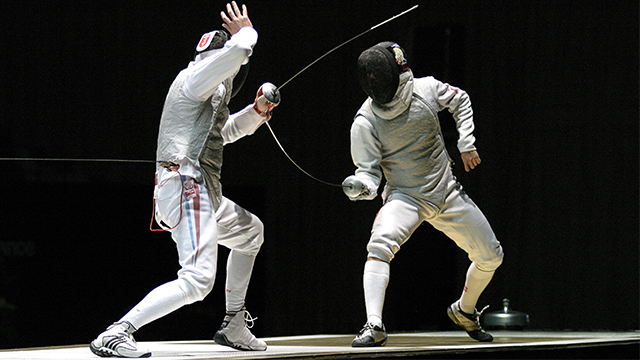5 Advantages of Learning Stage Combat
Written by Ashleigh Gardner
March 22, 2017
If you ever get a chance to take a class in stage combat, I highly suggest you jump at the opportunity. Learning the intricate techniques of fight choreography has many advantages, and a resume with stage combat listed is never a bad thing. We’ve got 5 reasons you should seek out an experienced fight choreographer to get your stage combat training on.
1. Teamwork.

When you’re learning fight choreography, it’s not just you onstage. You’ve got a partner, or several, and you’re learning the same moves together. Just as Isaac Newton stated that for every action, there is an equal and opposite reaction, you and your partner must work together to create a back and forth — action and reaction — that creates a story. Sometimes, you’ll even have to learn your partner’s moves so that you are aware of how they must move in response to your choreography. Learning fight choreography also builds trust between partners — just don’t stab your friend in the eye with a dagger.
2. Spatial awareness.

There are a lot of things to consider when you’re swinging a fist or a sword in the direction of your acting partner. Their safety, your safety, and the safety of bystanders (especially the audience) are at risk every time you engage in combat. When you learn stage combat, your body becomes more aware of how far it can move without striking a set piece or another actor. You’ll learn how far back you can step until you hit the edge of that staircase or how wide you can swing your arm so that you don’t hit the girl playing your sister.
3. Physical safety.

You’ll also become more aware of how your body moves, and you don’t just increase your own physical awareness (like who is in proximity to you). You also become more knowledgeable about how your tendencies may hurt your performance (or injure you physically). If you tend to step using the side of your foot, that could cause problems if you advance or retreat too quickly while engaging in swordplay. If you’re hitting your thigh too hard when you nap for that punch you deliver, you could seriously bruise your leg and cause nerve damage. It only takes 6 pounds of pressure to tear someone’s ear off, so after you’ve practiced “grabbing” your scene partner’s earlobe for the tenth time, you’ll really feel and understand the difference between literally grabbing his ear and just placing your thumb over his earlobe. Knowing the proper techniques can save your life and reduce the possibility of injury, both of yourself and your scene partners.
4. Physical fitness.

There’s no doubt that when you rehearse a scene that requires physical action that you’re bound to build muscle and get some exercise. Learning fight choreography is a great way to engage in learning new performance techniques while also treating your body to a workout. Think of it like dance but with beautifully and carefully staged violence.
5. Put it on your resume.

Last (but certainly not least), stage combat is a great addition to your acting and performance resume. If you attend an audition for a play that calls for characters to participate in hand-to-hand or sword combat, you’ll already have that kind of training under your belt. Additionally, if you attend an audition that doesn’t list stage combat skills, but you have it on your resume anyway, you may unexpectedly be considered for a role where you can utilize your training.
Need some advice? We’ve got you covered.
- 5 Tips for Leading the Double Life: the Performer/Technician Hybrid
- 10 Perks of Being a Cruise Ship Performer
- 5 Reasons Why YOU Should Choose Your Monologue
- What Makes an Actor Website WOW?
- “Is my attitude not getting me roles?” And Other Essential Questions for Actors
- 6 Steps to Memorizing Shakespeare
- 10 Tricks to Staying Healthy All Season Long
- What Does It Take to Break Into Voiceovers?
- 5 Tips for Nailing Your College Music Theatre Audition
- 10 Tips on Owning the Room at Competition
- How to Balance Theatre and Coursework
- The 10 Secrets of Great Understudying
- 10 Items Every Actor Should Carry in Their Rehearsal Bag
- 10 Items Every Dancer Should Keep in Their Rehearsal Bag
